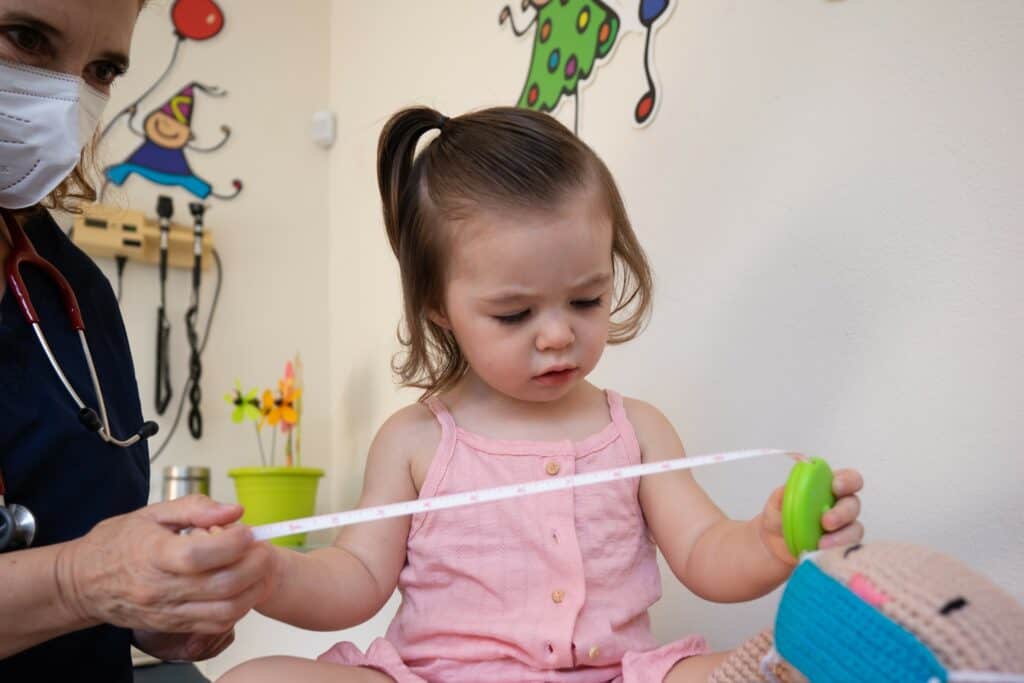Receiving a diagnosis for your child can be a difficult and overwhelming experience for any parent. Whether it’s a physical or mental health condition, parents may feel a range of emotions from shock and denial to sadness and anger. how to cope with a Childs diagnosis and adjusting to a new reality can be challenging, but it’s important to remember that you’re not alone.
Understanding the diagnosis and its implications is the first step in coping with your child’s health condition. It’s important to ask your child’s healthcare provider questions and clarify any uncertainties you may have. This can help you gain a better understanding of the diagnosis and what to expect moving forward. Additionally, seeking support from other parents who have gone through a similar experience can be helpful in navigating this new journey.
Key Takeaways
- Understanding the diagnosis is the first step in coping with your child’s health condition.
- Seeking support from healthcare providers and other parents can be helpful in navigating this new journey.
- It’s important to take care of your own mental health and well-being while parenting a child with a diagnosis.
Understanding the Diagnosis
Decoding Medical Terms
When a child is diagnosed with a medical condition, it can be overwhelming for parents to understand the medical terminology used by doctors and other medical providers. However, it is important to understand the diagnosis and what it means for the child’s health.
Parents should not hesitate to ask the doctor to explain any medical terms or acronyms that they do not understand. They can also do their own research to learn more about the condition and its symptoms. It can be helpful to keep a notebook or document with notes from doctor’s appointments and research to refer back to later.

Importance of Research
Research is an important part of understanding a child’s diagnosis. It can help parents understand the condition, its causes, and potential treatments. It can also help parents find support groups and resources for their child and family.
Parents should be cautious when researching online and make sure to use reputable sources, such as medical journals and government websites. They can also ask their child’s doctor for recommendations on trusted resources.
It is important for parents to remember that each child’s diagnosis and treatment plan is unique. While research can provide valuable information, it should not be used as a substitute for medical advice from a doctor.
Emotional Response to Child’s Diagnosis

Initial Reactions
Learning that a child has been diagnosed with a medical condition can be a shock to the system. Parents may experience a range of emotions, including feelings of denial, disbelief, and anger. These initial reactions are normal and can be overwhelming.
It is important for parents to recognize and acknowledge their feelings. They may need time to process the news and come to terms with the diagnosis. It is also important to seek support from family, friends, or a mental health professional.
Stages of Grief
Parents may experience grief after learning about their child’s diagnosis. The grief cycle can consist of several stages, including denial, anger, bargaining, depression, and acceptance.
Denial is a common initial reaction, as parents may struggle to accept the diagnosis. Anger may follow, as parents may feel helpless or frustrated. Bargaining may involve seeking alternative treatments or hoping for a misdiagnosis. Depression may set in as parents come to terms with the reality of the situation. Acceptance involves finding a way to move forward and adjust to the new normal.
It is important for parents to understand that the stages of grief are not linear and may not occur in a specific order. Parents may cycle through the stages multiple times and may experience different emotions at different times.
During this time, parents may experience personal confusion and self-doubt. It is important for parents to take care of themselves and seek support from others. This may include joining a support group, talking to a mental health professional, or finding ways to cope through self-care activities.
In summary, learning about a child’s diagnosis can be emotionally challenging for parents. It is important for parents to recognize and acknowledge their feelings and seek support during this time. The grief cycle may involve several stages, and it is important for parents to take care of themselves and seek support from others.
Coping Mechanisms
When a child is diagnosed with a medical condition, it can be overwhelming and stressful for both the child and their family. Coping mechanisms can help families adjust to the new reality and manage the stress that comes with it.

Acceptance and Adjustment
The first step in coping with a child’s diagnosis is to accept it. Acceptance does not mean giving up hope, but rather acknowledging the situation and finding ways to move forward. It is important to understand that adjustment takes time and that it is normal to experience a range of emotions.
Healthy Routines
Establishing healthy routines can help families manage stress and cope with the challenges of a child’s diagnosis. This includes maintaining a healthy diet, getting enough sleep, and engaging in physical activity. It is important to prioritize self-care and make time for activities that bring joy and relaxation.
Open Communication
Open communication is key to coping with a child’s diagnosis. It is important for parents to communicate openly with each other, their child, and their healthcare providers. This includes asking questions, expressing concerns, and sharing feelings. It is also important to seek support from family, friends, and support groups.
Coping strategies can vary depending on the child’s diagnosis and the family’s individual needs. It is important to work with healthcare providers to develop a plan that addresses the specific challenges of the diagnosis. With time, patience, and support, families can learn to cope with a child’s diagnosis and find ways to thrive.
Support Systems
Receiving a diagnosis for your child can be overwhelming and stressful. It is important to have a support system in place to help you cope with the challenges that may arise. There are several resources available that can provide emotional and practical support.

1. Family and Friends
Family and friends can be a great source of support during this difficult time. They can offer a listening ear, help with daily tasks, and provide emotional support. It is important to communicate your needs and feelings with them so that they can understand how best to support you.
2. Support Groups
Joining a support group can provide a sense of community and understanding. Support groups can be found through hospitals, clinics, and community centers. They offer a safe space to share experiences, ask questions, and receive emotional support from others who are going through similar experiences.
3. Online Resources
The internet provides a wealth of resources for families dealing with a diagnosis. Online forums and support groups can provide a sense of community and understanding, even if you are unable to attend in-person meetings. It is important to be cautious when using online resources and to verify the reliability of the information provided.
In conclusion, having a support system in place can help families cope with the challenges of a child’s diagnosis. Whether it be family and friends, support groups, or online resources, there are several options available to provide emotional and practical support.
Mental Health and Well-being
Dealing with Anxiety and Depression
Receiving a diagnosis for your child can be a challenging and emotional experience. It is common for parents to feel anxious, depressed, or overwhelmed by the news. These feelings are normal and valid, and it is important to acknowledge them. However, it is also important to take steps to manage these emotions and prioritize your mental health and well-being.
If you are struggling with anxiety or depression, consider seeking support from a mental health professional such as a psychologist or counselor. They can provide you with tools and techniques to manage your symptoms and cope with the challenges of your child’s diagnosis. Additionally, they can help you develop healthy coping strategies and provide a safe space to process your emotions.

Therapies and Treatments
There are several therapies and treatments available to support your child’s mental health. Depending on their diagnosis, they may benefit from cognitive-behavioral therapy (CBT), family therapy, or medication. It is important to work closely with your child’s healthcare provider to determine the best course of treatment for their specific needs.
CBT is a form of talk therapy that focuses on identifying and changing negative thought patterns and behaviors. Family therapy can help improve communication and strengthen relationships between family members. Medication may be prescribed to manage symptoms of certain mental health conditions, such as generalized anxiety disorder or anorexia nervosa.
Self-Care
Taking care of your own mental health is crucial when supporting a child with a mental health diagnosis. Practicing self-care can help reduce stress, improve mood, and increase resilience. Some self-care practices to consider include:
- Prioritizing sleep and exercise
- Engaging in activities that bring you joy and relaxation
- Practicing mindfulness or meditation
- Seeking support from friends and family
- Setting boundaries and saying no when necessary
Remember, taking care of yourself is not selfish. It is necessary to ensure you have the energy and emotional capacity to support your child through their journey.
Overall, coping with a child’s mental health diagnosis can be a difficult and emotional experience. However, prioritizing mental health and well-being can help you and your child navigate this challenging time with greater ease and resilience.
Parenting a Child with a Diagnosis
Parenting a child with a diagnosis can be challenging, but it is important to remember that you are not alone. With the right tools and support, you can help your child thrive. This section will cover some important aspects of parenting a child with a diagnosis, including education and understanding, maintaining a positive environment, and building a strong relationship.

1. Education and Understanding
One of the most important things you can do as a parent of a child with a diagnosis is to educate yourself about your child’s condition. This can help you better understand your child’s needs and how to support them. There are many resources available, including books, websites, and support groups.
It is also important to educate your child about their condition in an age-appropriate way. This can help them understand their own needs and feel more in control of their situation. Encourage your child to ask questions and be open and honest with them about their condition.
2. Maintaining a Positive Environment
Creating a positive environment for your child is crucial for their well-being. This can involve making modifications to your home or routine to accommodate your child’s needs. For example, if your child has a physical disability, you may need to make changes to your home to make it more accessible.
It is also important to focus on your child’s strengths and abilities, rather than their limitations. Encourage your child to pursue their interests and hobbies, and celebrate their achievements.
3. Building a Strong Relationship
Building a strong relationship with your child is key to helping them thrive. This can involve spending quality time together, listening to your child, and being supportive and encouraging.
It is also important to prioritize your relationship with your partner. Parenting a child with a diagnosis can be stressful, and it is important to have a strong support system. Make time for date nights or other activities that allow you to connect with your partner.
In conclusion, parenting a child with a diagnosis can be challenging, but with the right tools and support, you can help your child thrive. By educating yourself, maintaining a positive environment, and building a strong relationship, you can help your child reach their full potential.
Additional Resources
When a child is diagnosed with a medical condition, it can be overwhelming for parents and caregivers. It is important to have access to resources that can help them cope with the diagnosis and provide support for their child. Here are some additional resources that may be helpful:

1. Professional Help
Seeking professional help is an important step in coping with a child’s diagnosis. Psychologists and other mental health professionals can provide support and guidance to parents and caregivers. They can help them understand the diagnosis and develop coping strategies. The National Mental Health Association is a good resource for finding mental health professionals in your area.
2. Reliable Online Platforms
There are many online platforms that provide reliable information and support for parents and caregivers of children with medical conditions. Elizabeth Mazur, a researcher at Pennsylvania State University, recommends the following websites:
- KidsHealth: Provides information about various medical conditions and how to manage them.
- Family Voices: Provides resources and support for families of children with special health care needs.
- Parent to Parent USA: Provides support and resources for parents of children with disabilities and special needs.
3. Books and Literature
Books and literature can also be a helpful resource for parents and caregivers. They can provide information about the medical condition and offer advice on how to cope. Some recommended books include:
- “The Whole Parent: How to Become a Terrific Parent Even If You Didn’t Have One” by Debra Wesselmann, Cathy Schweitzer, and Stefanie Armstrong.
- “The Parent’s Guide to Medical Emergencies” by Paula Kelly.
- “The Family Guide to Mental Health Care” by Lloyd I. Sederer.
In conclusion, these additional resources can be helpful for parents and caregivers of children with medical conditions. It is important to seek professional help, use reliable online platforms, and read books and literature to better understand the diagnosis and develop coping strategies.
Frequently Asked Questions
What are some practical ways to support your child after a diagnosis?
After a diagnosis, it is important to provide your child with comfort and support. This can include creating a routine, maintaining open communication, and providing opportunities for your child to express their feelings. Additionally, it may be helpful to involve your child in their treatment plan and encourage them to ask questions.
How can you cope with the emotional impact of your child’s diagnosis?
A diagnosis can be emotionally challenging for both you and your child. It is important to take care of yourself and seek support from loved ones or a therapist. Additionally, finding ways to cope with stress, such as through exercise or meditation, can be helpful.
What are some common challenges faced by parents of chronically ill children?
Parents of chronically ill children may face challenges such as financial strain, managing appointments and medications, and navigating the healthcare system. Additionally, parents may experience feelings of guilt or worry about their child’s future.
Navigating the healthcare system can be overwhelming. It may be helpful to research your child’s condition and treatment options, ask questions, and advocate for your child’s needs. Additionally, finding a healthcare provider who specializes in your child’s condition can be beneficial.
What are some effective ways to communicate with your child’s healthcare providers?
Effective communication with healthcare providers is important for ensuring your child receives the best care possible. This can include preparing questions before appointments, taking notes during appointments, and following up with providers after appointments. Additionally, it may be helpful to bring a trusted friend or family member to appointments for support.
How can you find support and resources for yourself and your family during this time?
Finding support and resources can be helpful for both you and your family. This can include joining support groups, seeking counseling, and connecting with organizations that specialize in your child’s condition. Additionally, it may be helpful to reach out to friends and family for support.
Other similar posts:

Iesha is a loving mother of 2 beautiful children. She’s an active parent who enjoys indoor and outdoor adventures with her family. Her mission is to share practical and realistic parenting advice to help the parenting community becoming stronger.
